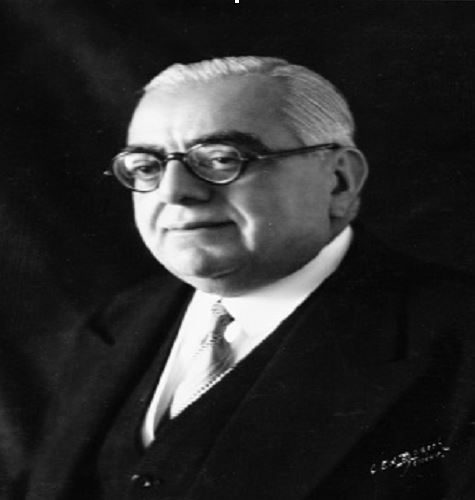(Credits to Mehnoob Aly Manji and Edited by Kainat Rajput)
Architect of Muslim Renaissance and Education in South Asia
Sir Sultan Muhammed Shah, Aga Khan III, is recognized as one of the leading Muslim reformers of the twentieth century, a forward-thinking politician, scholar, and spiritual figure whose influence greatly shaped the future of Muslims in South Asia and beyond. His lifelong commitment was based on a single, unchanging belief: that education acts as the fundamental pathway to dignity, advancement, and harmony. As we commemorate the 148th anniversary of his birth and look forward to the opening of the Ismaili Centre Houston in November 2025, a contemporary symbol of learning and service, it is appropriate to reflect on his significant contributions that continue to illuminate Muslim communities worldwide. (Manji, “Sir Aga Khan III Contribution,” 2025)
Champion of Educational Renaissance
During a period when the Muslim population of the Indian subcontinent endured poverty, lack of education, and political exclusion, Aga Khan III understood that change could not be solely rooted in politics; it necessitated a revival of intellect and morals. He dedicated his existence to promoting modern education based on faith and moral principles. By leading the Muhammadan Educational Conference initiated by Sir Syed Ahmad Khan in 1886, he elevated a local initiative into a nationwide movement advocating educational reform. At the 1902 Karachi meeting, he proclaimed,
“For a community to be powerful, it must rest upon the base of education. Without education, there can be neither freedom, progress, nor dignity.” (Aga Khan III, Speech at Aligarh, 1911; Manji, 2025)
His aspirations went beyond achieving literacy; he aimed to foster a self-assured Muslim community able to harmonize theological beliefs with contemporary science and civic duties.
The Aligarh Movement and Muslim University Campaign
One of Aga Khan III’s lasting impacts was his role in converting the Mohammedan Anglo-Oriental (MAO) College at Aligarh into a full-fledged university. Many of his contemporaries were sceptical about the feasibility of such an ambitious venture for a disadvantaged community. Nevertheless, his captivating leadership and compelling charisma rallied Muslims throughout India in an unprecedented sense of unity. During his landmark visit to 1911 visit to Lahore, he initiated a fundraising effort that became legendary. Witnesses noted that prominent scholars like Allama Iqbal, Allama Sulaiman Nadvi, and Hasrat Mohani personally removed the horses from his carriage and drew it through the streets themselves, a gesture signifying respect and solidarity among Muslims. (Manji, 2025; Daftary, The Ismailis: Their History and Doctrines, 1998) This vigorous movement led to the creation of Aligarh Muslim University (AMU) in 1920, a pivotal institution in Muslim higher education that continues to flourish to this day. The university emerged not just as a place of study but also as a source of intellectual and cultural pride for the Muslim community. (K.K. Aziz, The Making of Pakistan, 1967)
A Reformer of Thought and Society
Aga Khan III’s approach to reform reached well beyond just organizations. He imagined Islam as a belief system that balances intellect with divine guidance, progressive ideas with traditional values. In his Memoirs published in 1954, he remarked that “faith and reason must march hand in hand,” encouraging Muslims to critically engage with modernity while maintaining spiritual authenticity. (Aga Khan III, Memoirs of Aga Khan, 1954) He was a strong proponent of women’s education and societal inclusion, stressing that if a family had the means to educate a single child, it should be the daughter, because an educated mother cultivates an enlightened future generation. (Manji, 2025; Naoroji, Education and Reform in British India, 1956)
This forward-thinking advocacy represented a fundamental change in the social perspectives of Muslims and established the foundation for subsequent community-driven initiatives that supported gender equality.
Global Statesman and Advocate of Muslim Unity
The reach of Aga Khan III’s impact was far greater than South Asia alone. His diplomatic efforts culminated in his election as the President of the League of Nations (1937–1938), making him the first Muslim to assume this role. This milestone highlighted the global acknowledgment of his intelligence and ethical integrity. (Daftary, 1998; Karim, Islamic Leadership in the Modern Age, 2003) He continuously utilized international forums to promote Muslim unity, interfaith dialogue, and social justice. His political philosophies focused on tolerance, collaboration, and moral governance. His writings, especially in India in Transition from 1918, presented a thoughtful perspective on reform that continues to echo in modern conversations regarding Muslim identity. (Aga Khan III, India in Transition, 1918)
Diamond Jubilee Schools: Education as Celebration
In 1946, celebrating sixty years of his leadership, the Ismaili community honoured the Diamond Jubilee of Aga Khan III not through statues or monuments but through schools and scholarships.
The founding of Diamond Jubilee Schools throughout South Asia and East Africa represented his belief that true celebration comes through service and education. These institutions significantly increased educational opportunities for many, particularly for girls and children in rural areas. Completely funded by contributions from the community, they reflect his conviction that education is both a sacred responsibility and a path to social freedom. (Manji, 2025; Nanji, The Ismailis and Modernization, 1985) The Diamond Jubilee Schools served as an example for community progress, motivating similar ventures within the Muslim community.
Continuity Through Modern Institutions
The heritage of Sir Aga Khan III was advanced by his grandson, His Late Highness Aga Khan IV (1936–2025), by translating his grandfather’s principles into action through the formation of the Aga Khan Development Network (AKDN), Aga Khan Foundation (AKF), and Aga Khan University (AKU). These institutions reflect the ideals of integrating faith with service, advocating for pluralism, and fostering academic excellence. (Manji, 2025; Daftary, 1998)
Under the leadership of His Highness Prince Rahim Aga Khan V, the 50th Imam of the lineage, these organizations now extend their reach internationally, covering regions from Asia and Africa to Europe and North America, providing educational, healthcare, and leadership opportunities grounded in ethical commitment. Their efforts illustrate how the initiatives begun by Aga Khan III have evolved into a comprehensive network for humanitarian and educational advancement.
Entrepreneurship and Ethical Empowerment
Aga Khan III frequently highlighted the significance of financial self-sufficiency as crucial for the respect of the community. His successors have built upon this foundational idea through programs such as OPEN-BIG-PAGE (Progressive Enterprises Nexus – Bilateral Investment Gateway for Prosperity, Advancement, Growth, and Entrepreneurship). This contemporary initiative links entrepreneurship and social good, reflecting his conviction that material advancements should aim for ethical purposes. (Manji, 2025) By connecting creativity with community growth, these initiatives embody his vision of merging wealth with kindness.
The Ismaili Centre Houston: A Living Tribute
The upcoming Ismaili Centre Houston, set to debut on November 6, 2025, represents the enduring principles championed by Aga Khan III, education, conversation, and altruism.
Covering eleven acres with a constructed area of 150,000 square feet, it is destined to be the most extensive of the seven Ismaili Centres across the globe. Crafted to serve as a cultural and spiritual centre, it will offer areas for prayer, civic dialogue, and communal gardens, functioning as a dynamic link among different cultures and beliefs. More than just a stunning architectural creation, it embodies a vision that has persisted for a century that the combination of knowledge and faith can uplift humanity. (Manji, 2025; Karim, 2003)
Lasting Impact and Modern Relevance
The true evaluation of Aga Khan III’s impact is evident not only in the institutions he established but also in the intellectual and moral revival he ignited. He inspired a strong sense of self-confidence among Muslims that was grounded in values and education. His advocacy for gender equality, civic duty, and interfaith dialogue remains critically important in a world seeking ethical guidance amidst rapid technological advancements. His declaration that “education is the greatest of all resources; it is the root of all progress in every nation” encapsulates the core of his beliefs — a notion that continues to inspire educators and reformers today. (Aga Khan III, Memoirs of Aga Khan, 1954)
Conclusion: A Legacy of Light and Learning
Honouring Sir Sultan Muhammed Shah, Aga Khan III is not only a remembrance; it reaffirms principles that go beyond generations, faith founded on logic, advancement linked to ethics, and leadership committed to service. From the establishment of Aligarh Muslim University to the launch of Diamond Jubilee Schools, and from his leadership in the League of Nations to the global organizations that his heirs still sustain, his legacy remains a beacon for today’s Muslim civilization. In a time increasingly influenced by technological progress, his insights remind us;
“Progress without morality is hollow, and knowledge without compassion is incomplete.”
May his legacy continue to motivate upcoming generations to seek knowledge, unity, and a commitment to serving humanity, the lasting foundations of the Muslim renaissance he envisioned so eloquently.


